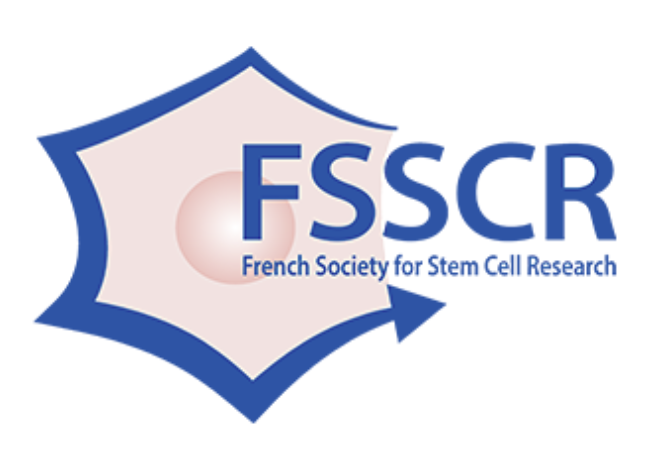News, events, publications, jobs and more...
Call for applications - Engineer
UMRS_1193 (Inserm, Paris-Saclay University) is looking for a cellular and tissue engineer for a one-year fixed-term contract (CDD), renewable. The candidate will work within the "Ciliopathies and Biliary Organogenesis" team on an innovative project aimed at developing a biliary tube on a microfluidic chip for physiopathological and toxicological analysis.
The candidate will be responsible for methodological development in the following areas: bioprinting, cell and tissue culture, organoid imaging, toxicology.
Please download the text of the announcement ![]()

Call for applications - Engineer
UMRS_1193 (Inserm, Paris-Saclay University) is looking for a cellular and tissue engineer for a one-year fixed-term contract (CDD), renewable. The candidate will work within the "Ciliopathies and Biliary Organogenesis" ...

The liver: this little-known super-organ
On the occasion of the sixtieth anniversary of the creation of Inserm, the 30' Santé program of the institute focuses on the liver, "this little-known super-organ".

Professor Didier Samuel, President of Inserm and Vice-President of IFBF, recalled why the liver can be described as the "body's factory" and an "anatomical crossroads" before characterizing the different phases of chronic diseases that affect this organ and the preventive measures to be taken.
As for him, Professor Jean-Charles Duclos-Vallée, President of IFBF, reviewed the different areas of research in the biofabrication of liver tissues.
The liver: this little-known super-organ
On the occasion of the sixtieth anniversary of the creation of Inserm, the 30' Santé program of the institute focuses on the liver, "this little-known super-organ"...

Engineering in vitro Human Physiology-Tissues, Organoids and Organs-on-Chip for Clinical Applications
The Japan Society for the Promotion of Science (JSPS) is organizing, with the University of Tokyo and Sorbonne Université, a seminar dedicated to "Engineering in vitro Human Physiology-Tissues, Organoids and Organs-on-Chip for Clinical Applications". The seminar will be held in Paris on November 18-19, 2024. Registration is now open, until November 8.
To view the program, please download it or visit the JSPS website.
Registration is online.
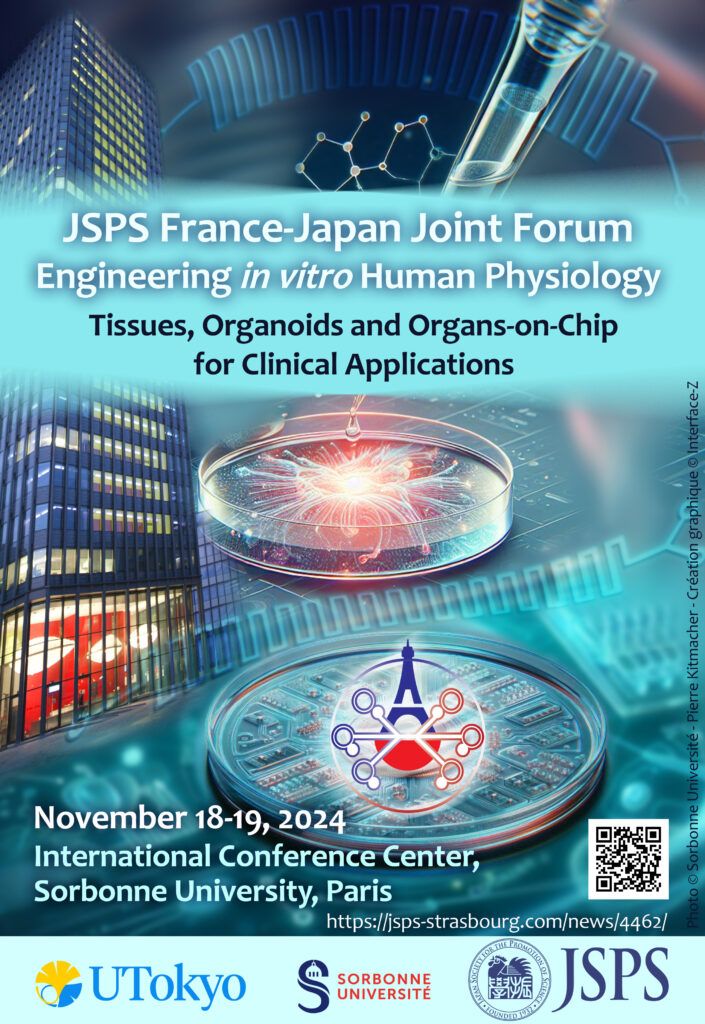
Engineering in vitro Human Physiology-Tissues, Organoids and Organs-on-Chip for Clinical Applications
The Japan Society for the Promotion of Science (JSPS) is organizing, with the University of Tokyo and Sorbonne Université, a seminar dedicated to "Engineering in vitro Human Physiology-Tissues, Organoids and Organs-on-Chip for Clinical Applications"...

HYBRIDA "Ethics of organoids" conference - 19 juin 2024
After the successful hybrid event in Brussels, HYBRIDA "Ethics of organoids" organises a fully on-line event on the 19th of June 2024 for researchers with a comprehensive overview of the project operational guidelines.
Please register here.
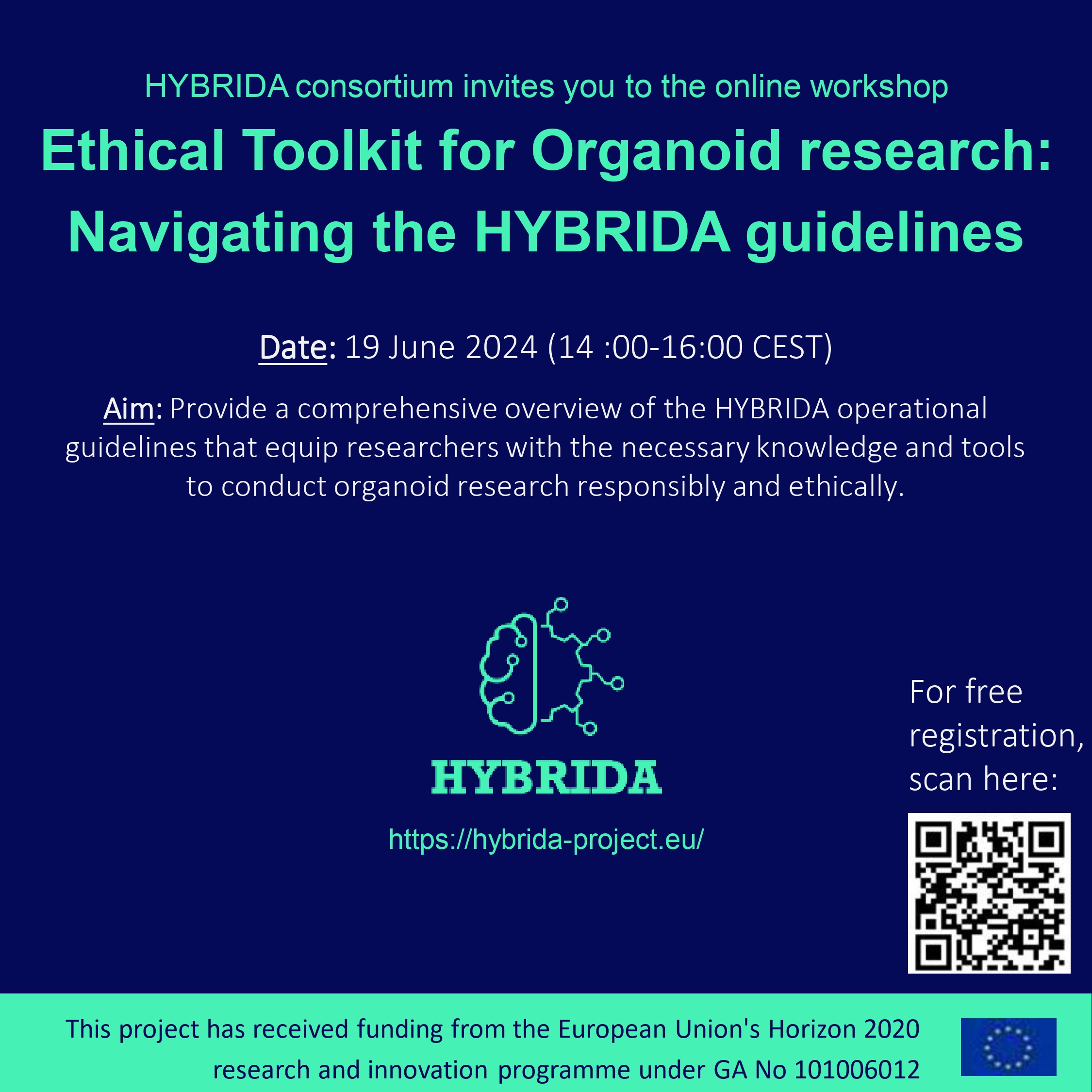
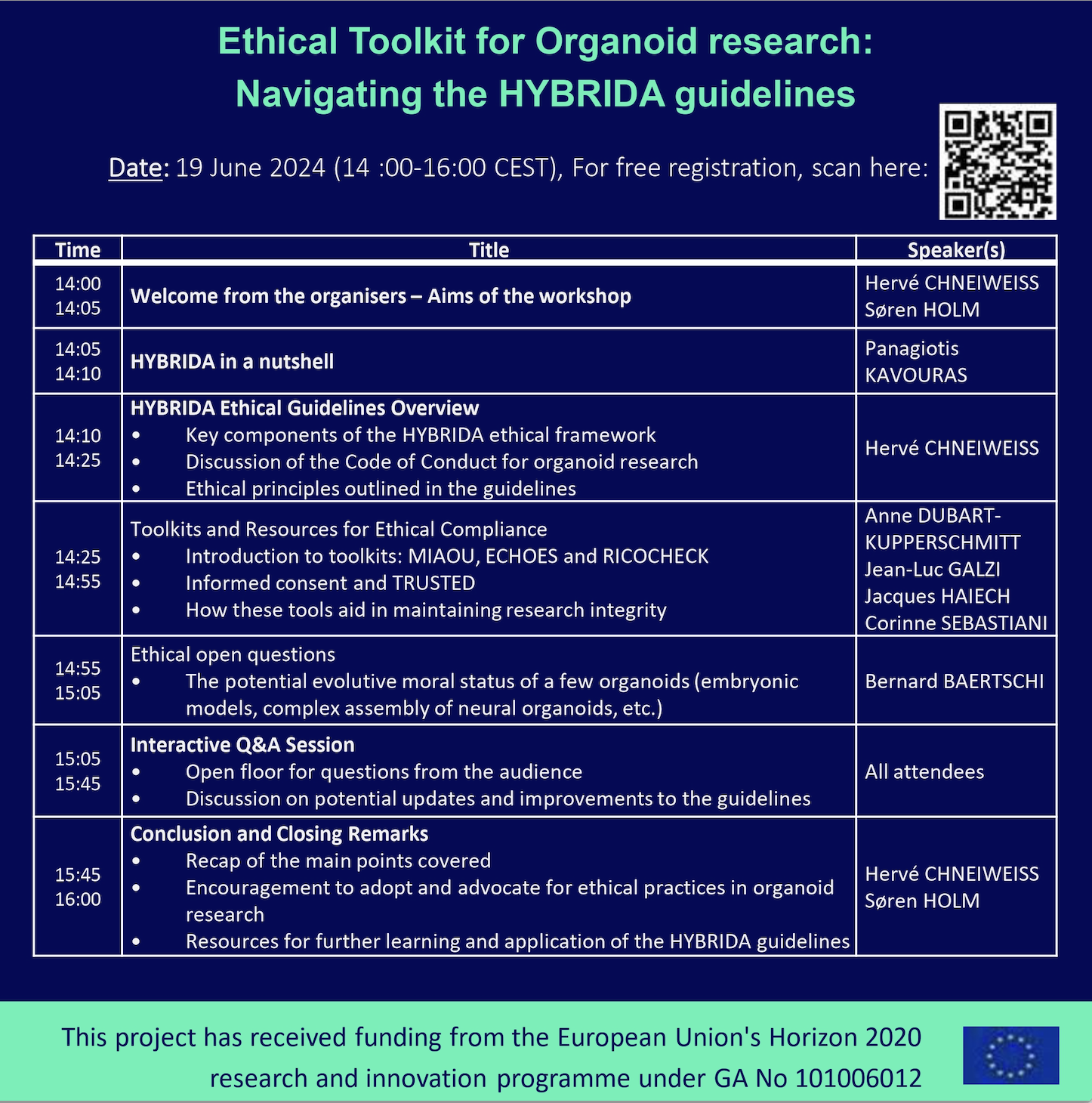
HYBRIDA "Ethics of organoids" conference - 19 juin 2024
After the successful hybrid event in Brussels, HYBRIDA "Ethics of organoids" organises a fully on-line event on the 19th of June 2024...

Call for applications: till July 15th 2024
The call for applications launched by UMR_S 1193 (Inserm - Université Paris-Saclay) is extended till July 15th 2024.
The selected person will have to propose a project to constitute a team specialized in the production of multi-cellular liver organoids from human stem cells. The organoids will be used in cell therapy, liver disease modeling and pharmaco-toxicology projects.
This proposal will be presented to the “Amorçage Jeunes Equipes 2024” call for projects launched by the Foundation for Medical Research (Fédération pour la Recherche Médicale -FRM).
Download the call text here.
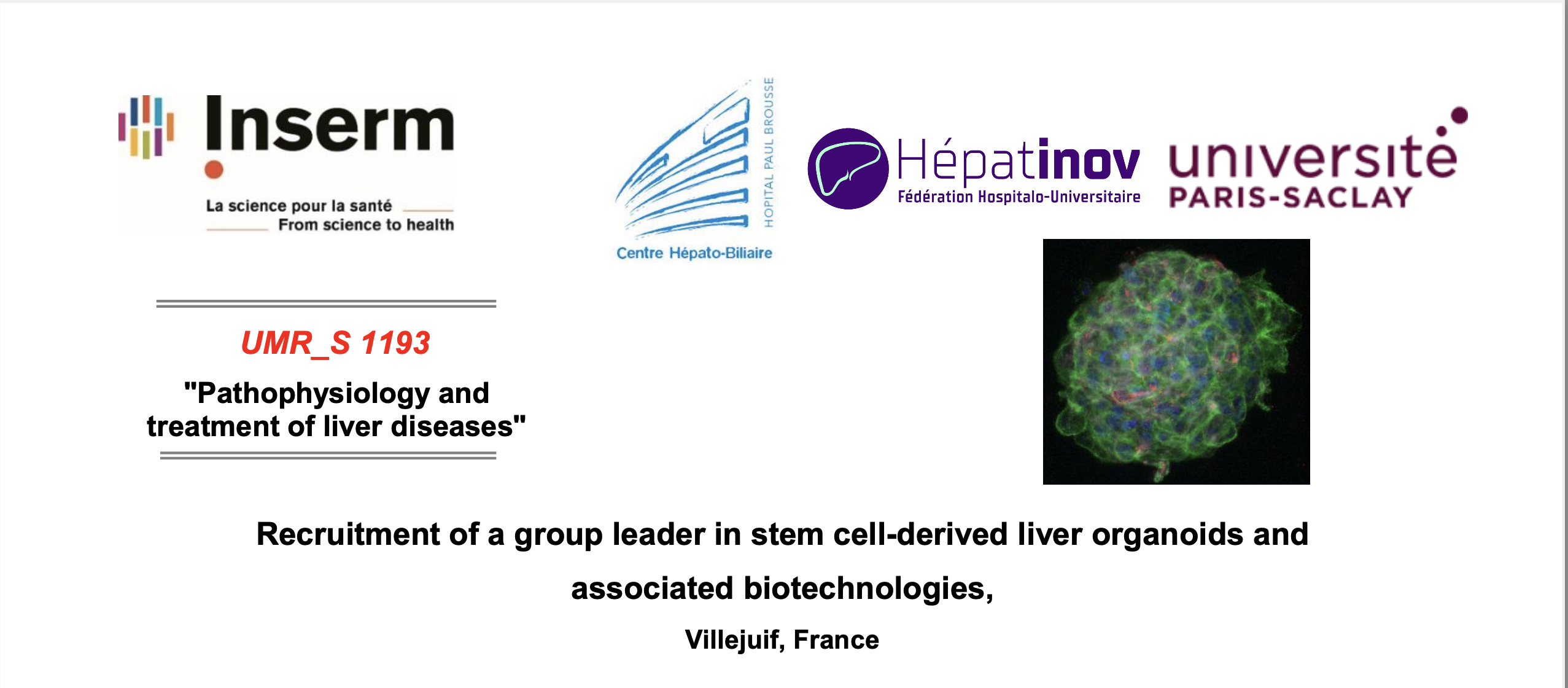
Call for applications: till July 15th 2024
The call for applications launched by UMR_S 1193 (Inserm - Université Paris-Saclay) is extended till July 15th 2024.
The selected person will have to propose a project to constitute a team specialized in the production of multi-cellular liver organoids...

Call for applications
UMR_S 1193 (Inserm - Université Paris-Saclay) is launching an international call for applications.
The selected person will have to propose a project to constitute a team specialized in the production of multi-cellular liver organoids from human stem cells. The organoids will be used in cell therapy, liver disease modeling and pharmaco-toxicology projects.
This proposal will be presented to the “Amorçage Jeunes Equipes 2024” call for projects launched by the Foundation for Medical Research (Fédération pour la Recherche Médicale -FRM).
Download the call text here.
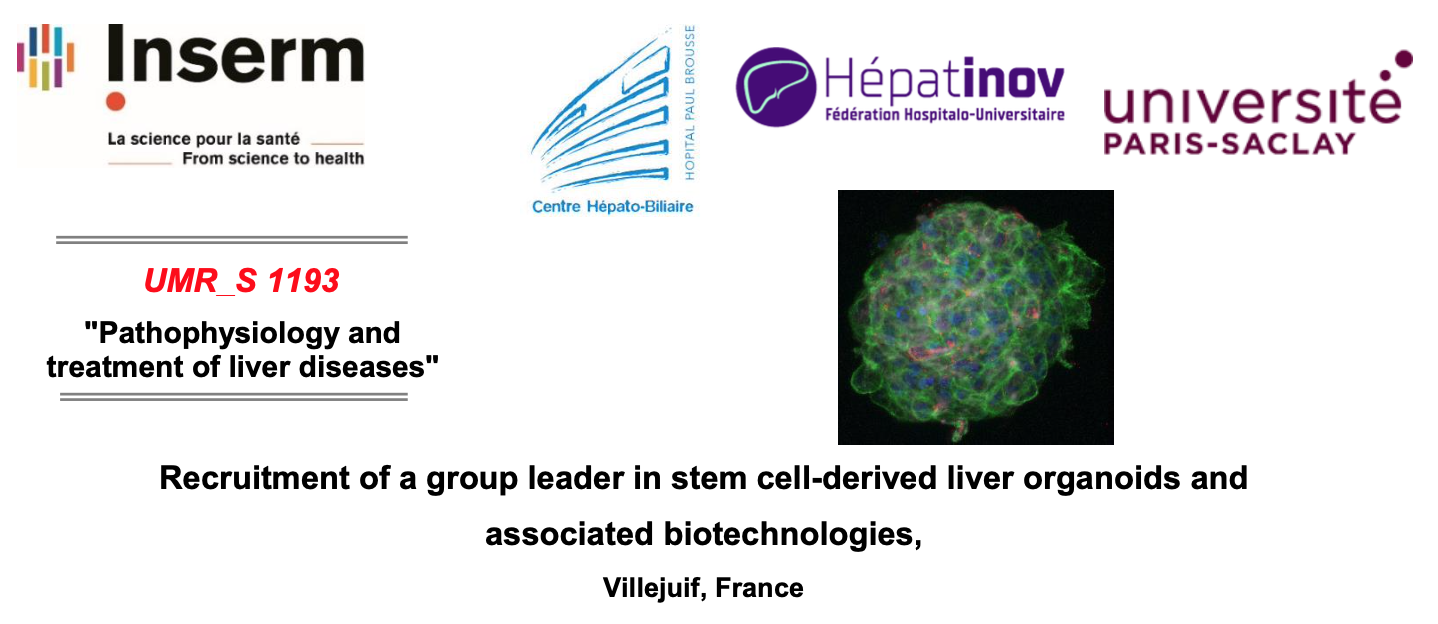
Call for applications
UMR_S 1193 (Inserm - Université Paris-Saclay) is launching an international call for applications.
The selected person will have to propose a project to constitute a team...

Tissue and organ bioengineering 2024
The Bioconstruction webinar “Tissue and organ bioengineering” will take place on April 3, 4 and 5 2024.
This webinar is co-organized by CentraleSupélec, ENS Paris-Saclay, Ecole Polytechnique and AP-HP.
Biofabrication aims at the design of bio-artificial systems on the one hand and the creation of functional tissues and organs on the other. It opens the way to regenerative medicine allowing the repair or replacement of damaged organs while freeing itself from the constraints of organ donation and the rejection of transplants. Biomanufacturing is interdisciplinary; it integrates the sciences of engineering and biology with medicine and clinical practice.
Please download the program.
Registration is free but required via this link.
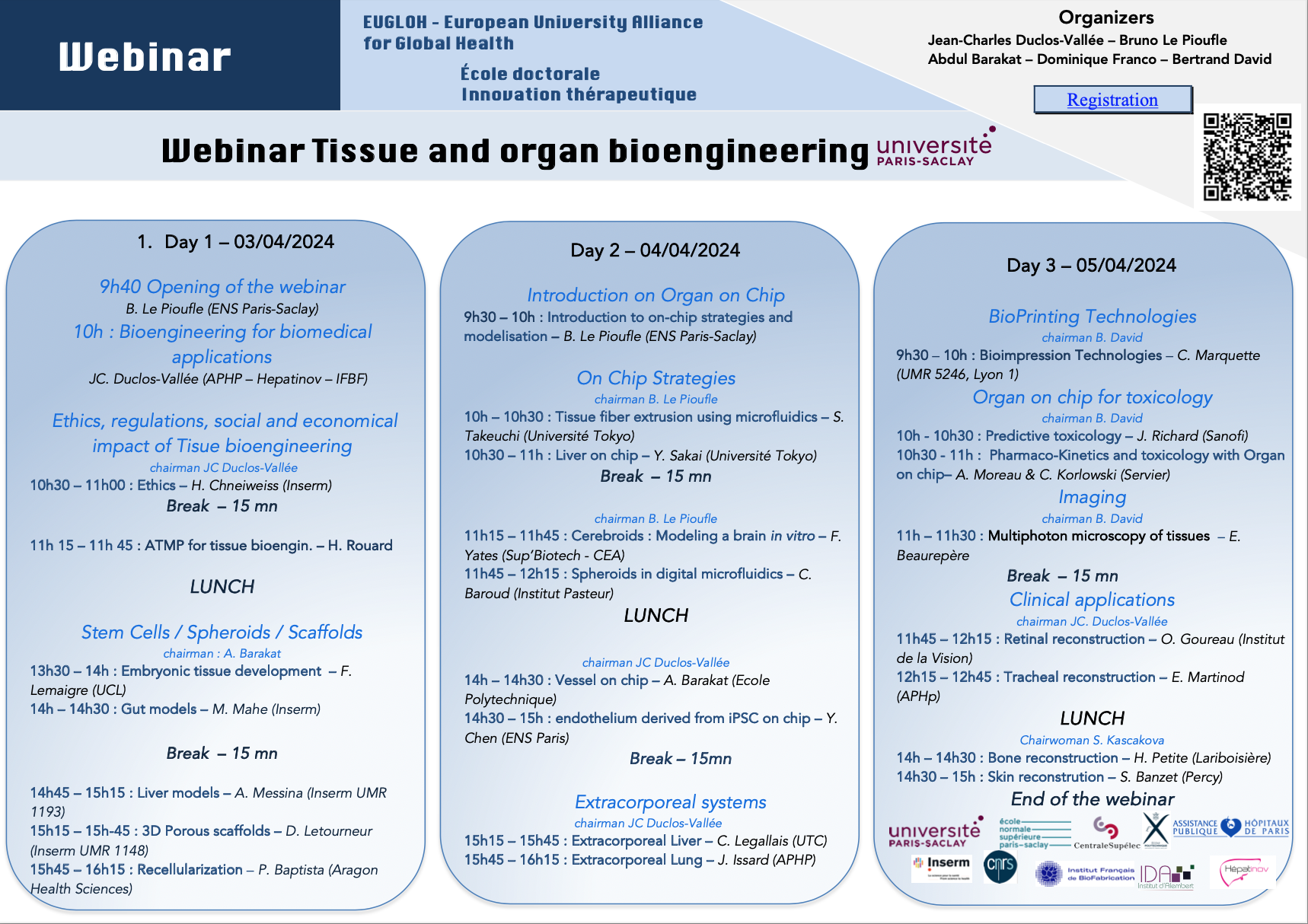
Tissue and organ bioengineering 2024
The Bioconstruction webinar “Tissue and organ bioengineering” will take place on April 3, 4 and 5 2024. This webinar is co-organized by CentraleSupélec, ENS Paris-Saclay, Ecole Polytechnique and AP-HP.
Biofabrication aims at the design...

iPearls at the FSSCR annual meeting
The iPearls project, sponsored by the Ile-de-France region and managed by Cyprio, a biotech company, an Inserm research unit (UMR_1193) and IFBF, was presented at the recent conference of the FSSCR which was held in Paris from the 22nd to the 24th of January 2024.
iPearl was the subject of both an oral presentation and a poster that was elected best poster by the public.
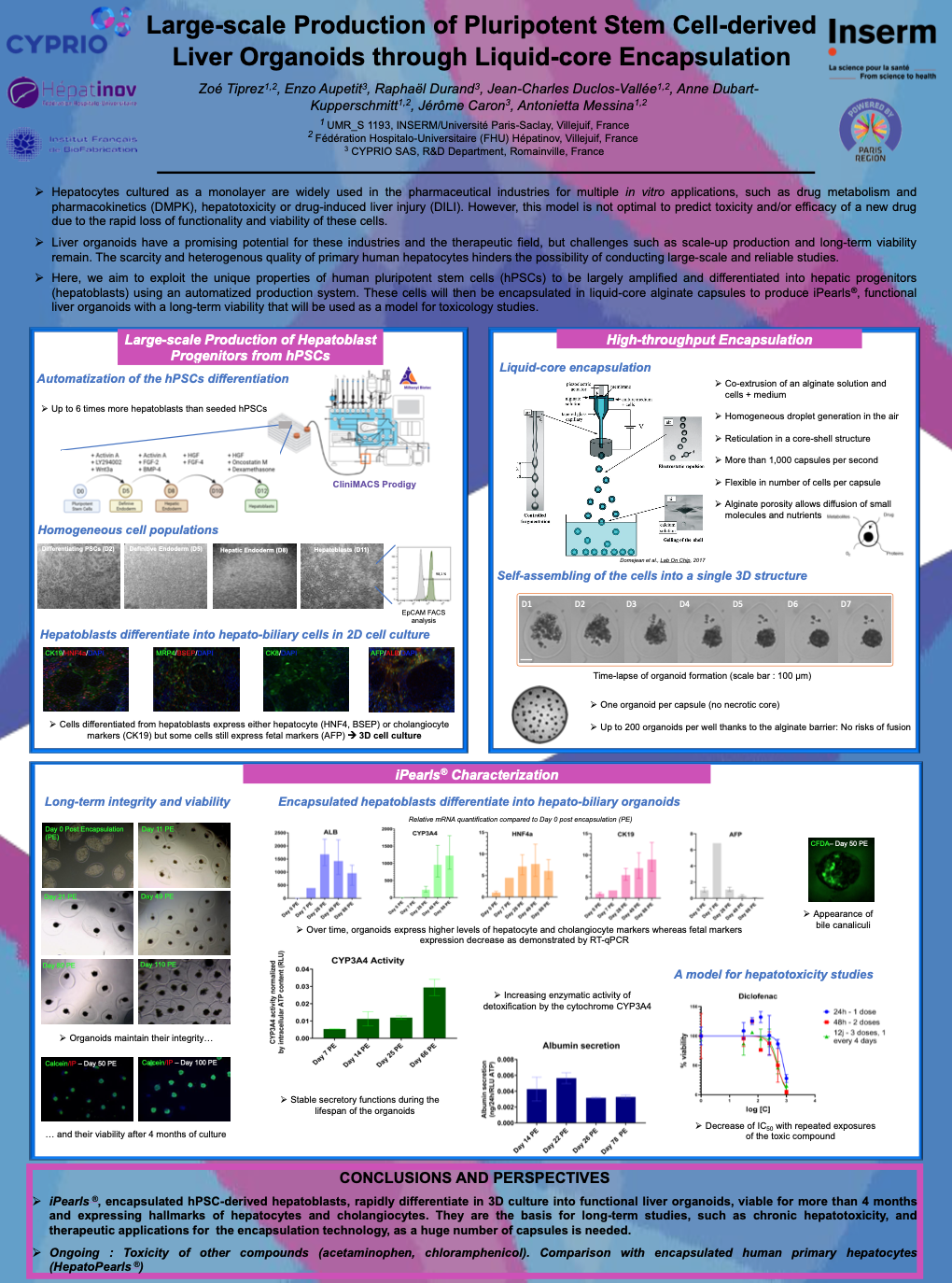
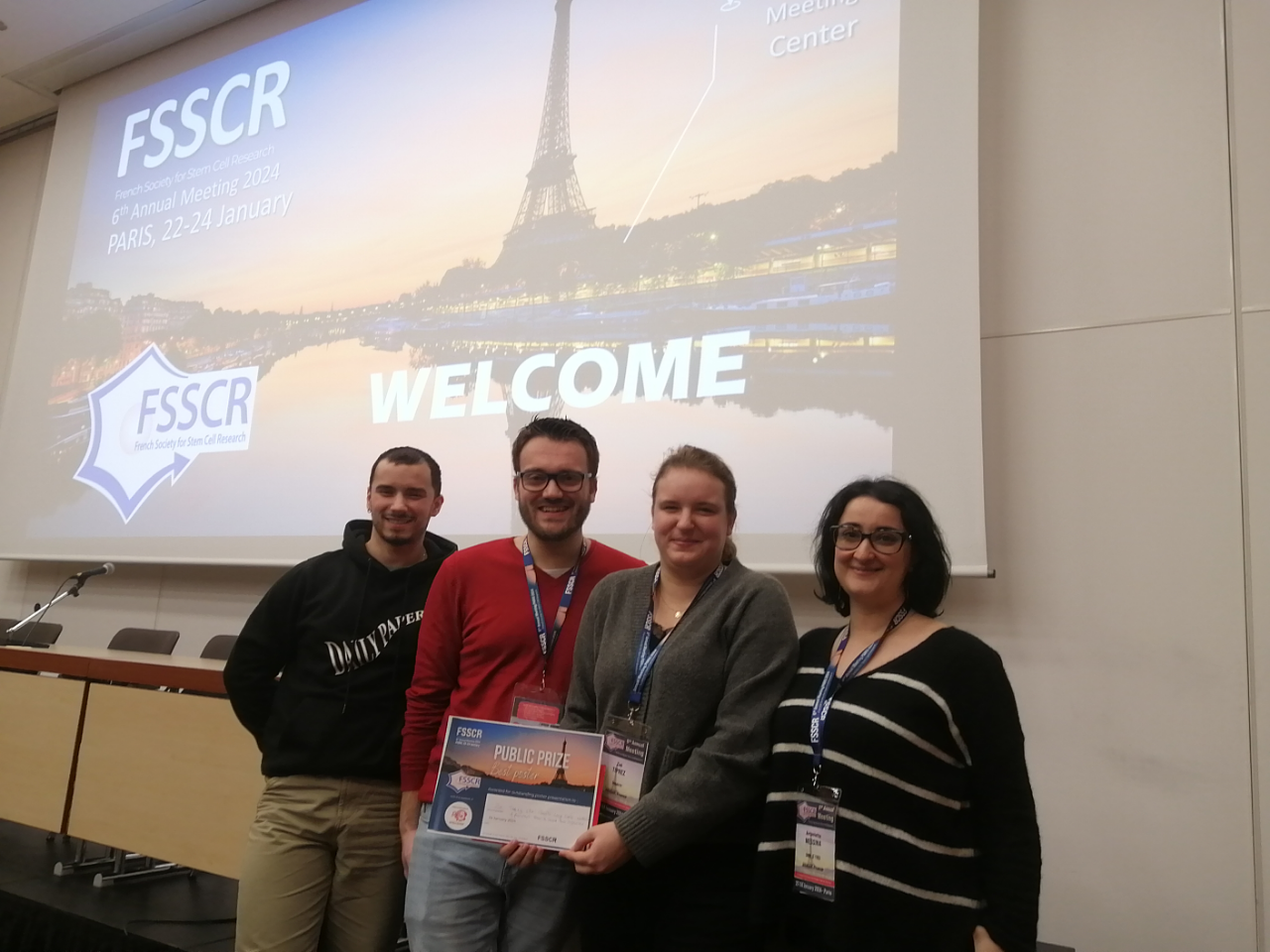
The happy award winners: Enzo Aupetit & Jérôme Caron (Cyprio), Zoé Tiprez & Antonietta Messina (UMR_1193)
You can dowload the iPearls poster by clicking here.
iPearls at the FSSCR annual meeting
The iPearls project, sponsored by the Ile-de-France region and managed by Cyprio, a biotech company, an Inserm research unit (UMR_1193) and IFBF, was presented at the recent conference of the FSSCR...
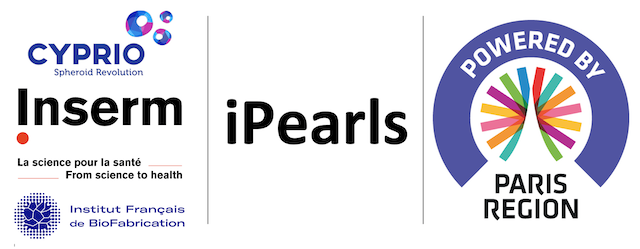
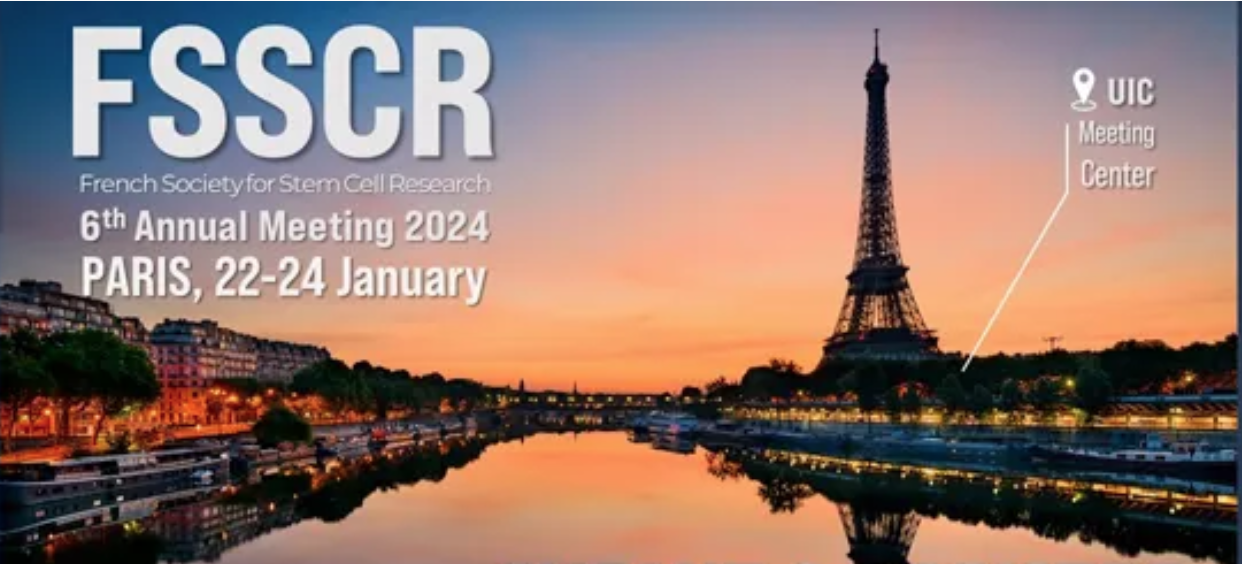
Organoids are not mini-organs
In a column in the newspaper Le Monde - Sciences & Médecine, members of the IFBF with other scientists call for organoids not to be considered as "mini-organs" because "they are still far from reproducing the function of entire organs in vitro and from restoring it in the human body". The authors of this column warn of the negative interpretations that could result as well as the unjustified hopes that could rise.
![]()
Organoids are not mini-organs
In a column in the newspaper Le Monde - Sciences & Médecine, members of the IFBF with other scientists call for organoids...
ARM Tissue Engineering and Therapeutics Workshop
The Alliance for Regenerative Medicine will hold a 1-day workshop on Tissue Engineering and Therapeutics on September 6, 2023.
This workshop will highlight scientific advances, CMC (chemistry, manufacturing, and controls) and regulatory insights, and funding perspectives.
It will take place in Bethesda, Rockville MD but participating remotely is possible.
Please see the program of the day and register by visiting the ARM web site here.
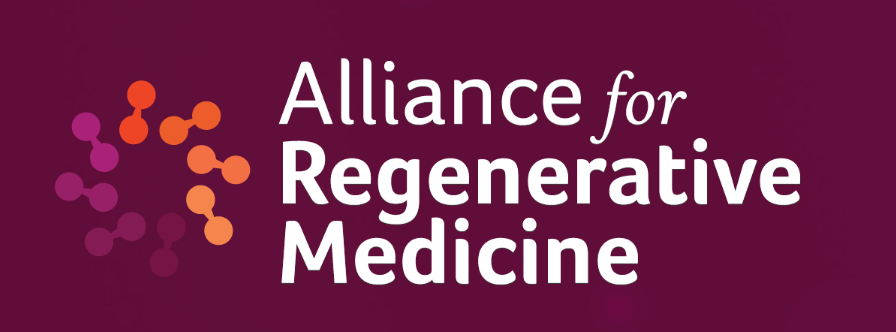
ARM Tissue Engineering and Therapeutics Workshop
The Alliance for Regenerative Medicine will hold a 1-day workshop on Tissue Engineering and Therapeutics on September 6, 2023...

Paris-Saclay University: bioengineering and synthetic biology day
Paris-Saclay University is organizing a scientific day “Bio-Engineering and Synthetic Biology”. This symposium aims to bring together researchers from different fields (from protein engineering to artificial organs) so that the different communities can get to know each other and collaborate in the future.
Hepatic and brain organoids, organs-on-chip and bio-artificial organs will be presented by members of IFBF.
The symposium will take place on Wednesday, November 16, 2022.
You can access the presentation of the day and the conditions of registration by clicking here or by downloading this document.
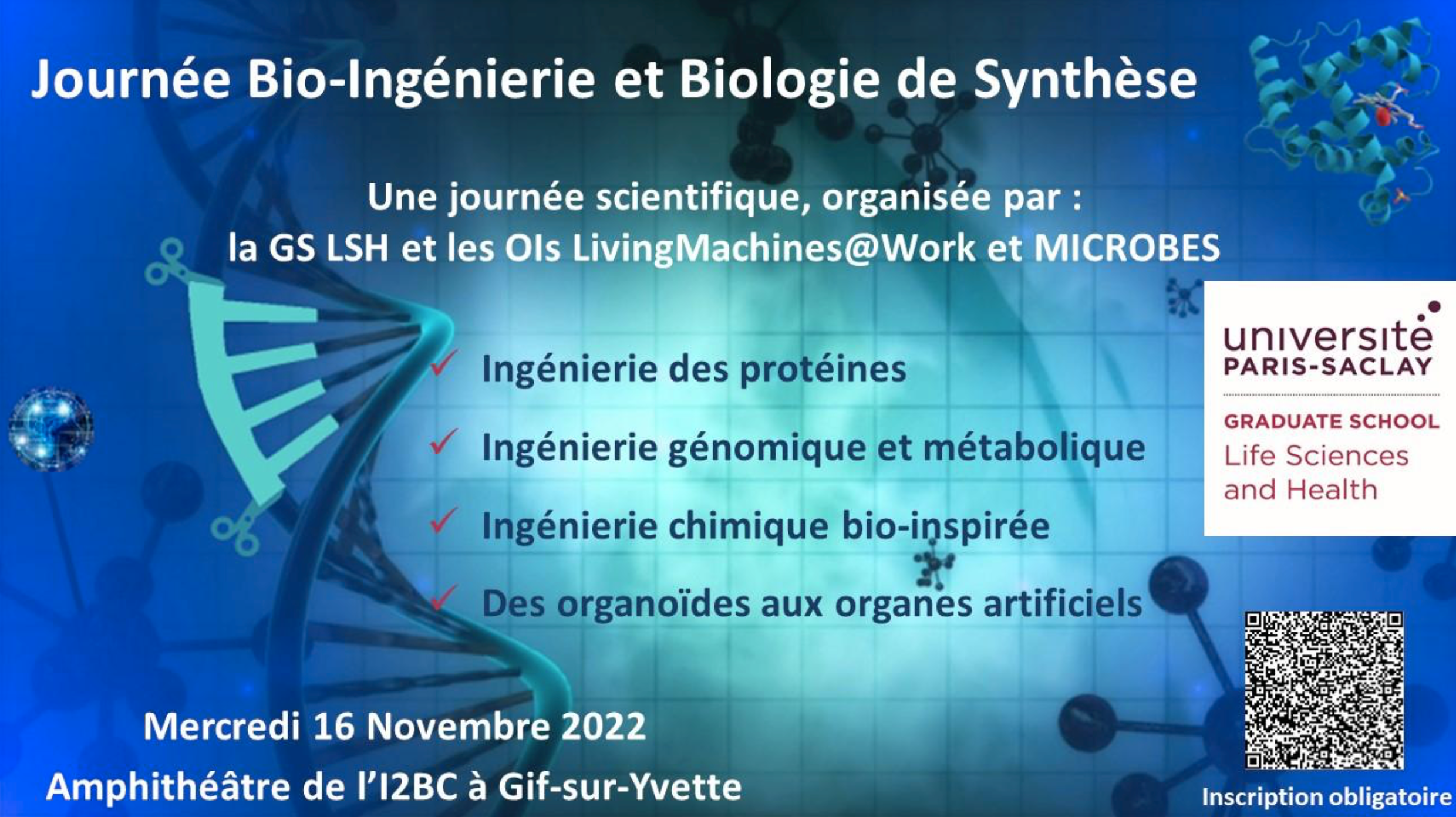
Paris-Saclay University: bioengineering and synthetic biology day
Paris-Saclay University is organizing a scientific day “Bio-Engineering and Synthetic Biology”. This symposium aims to bring together...

Cyprio continues recruiting
Specialized in the production and sales of hepatic spheroids encapsulated in an alginate pearl with a liquid core, Cyprio offers a permanent position to an engineered in fluidics & automation.
Cyprio collaborates with UMRS_1193 in the research project iPearls.
Read the text of the offer here.
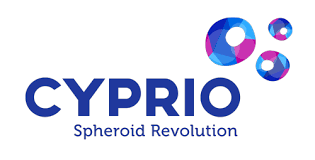
Cyprio continues recruiting
Cyprio offers a permanent position to an engineered in fluidics & automation...

Cyprio is hiring!
Specialized in the production and sales of hepatic spheroids encapsulated in an alginate pearl with a liquid core, Cyprio offers a permanent position to a laboratory technician.
Read the text of the offer here (in French).

Cyprio is hiring!
Cyprio offers a permanent position to a laboratory technician...

FRM: 2 members of IFBF winners of the 2021 restorative medicine call for projects
FRM has made research in restorative medicine a priority area of research support.
Following its 2021 call for projects, 7 proposals were selected, including 2 presented by members of IFBF.
Maxime Mahé leads the project "Recreating a transplantable human small intestine" using intestinal organoids reconstituted by bioengineering and Jean-Charles Duclos-Vallée the pre-clinical trial "Organoids to replace the liver?".
You will find the description of the projects financed by FRM on this page of its site (in French).
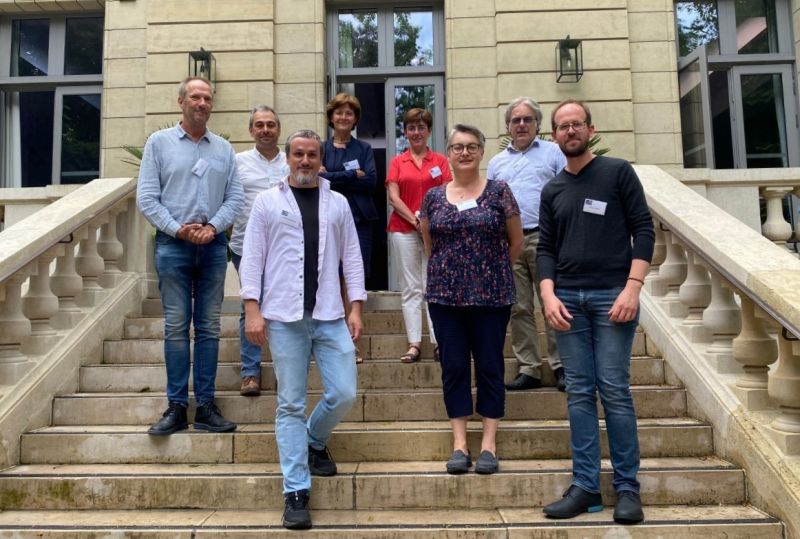
The call winners, including M. Mahé on the right and JC Duclos-Vallée behind him,
gathered at the FRM headquarters last May.
FRM: 2 members of IFBF winners of the 2021 restorative medicine call for projects
FRM has made research in restorative medicine a priority area of research support.
Following its 2021 call for projects, 2 proposalspresented by members of IFBF were selected.
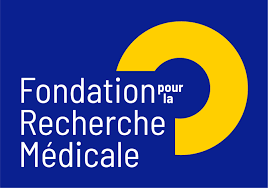
Engineer position
This offer of an engineer position is part of a project supported by the Ile-de-France region which aims at producing on a medium/large scale hepatic organoids from induced pluripotent stem cells. These organoids will be encapsulated in alginate beads and will used in predictive toxicology. This project is carried out thanks to an academic (UMR_S 1193) and industrial (CYPRIO) partnership. UMR_S 1193 and CYPRIO are both members of IFBF.
Read the text of the offer here.

with
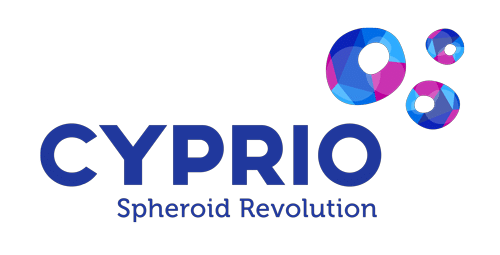
Engineer position
This offer of an engineer position is part of a project supported by the Ile-de-France region which aims at producing on a medium/large scale hepatic organoids...

with

Human ear reconstruction
3DBio Therapeutics, a regenerative medicine company, and the Microtia-Congenital Ear Deformity Institute announced they have conducted a human ear reconstruction using a patient-matched, 3D-bioprinted living tissue ear implant. The groundbreaking reconstructive procedure in the first-in-human Phase 1/2a clinical trial is evaluating the safety and preliminary efficacy of the implant for patients with microtia, a rare congenital deformity where one or both outer ears are absent or underdeveloped.
You will fin the press release here or on the BusinessWire site.
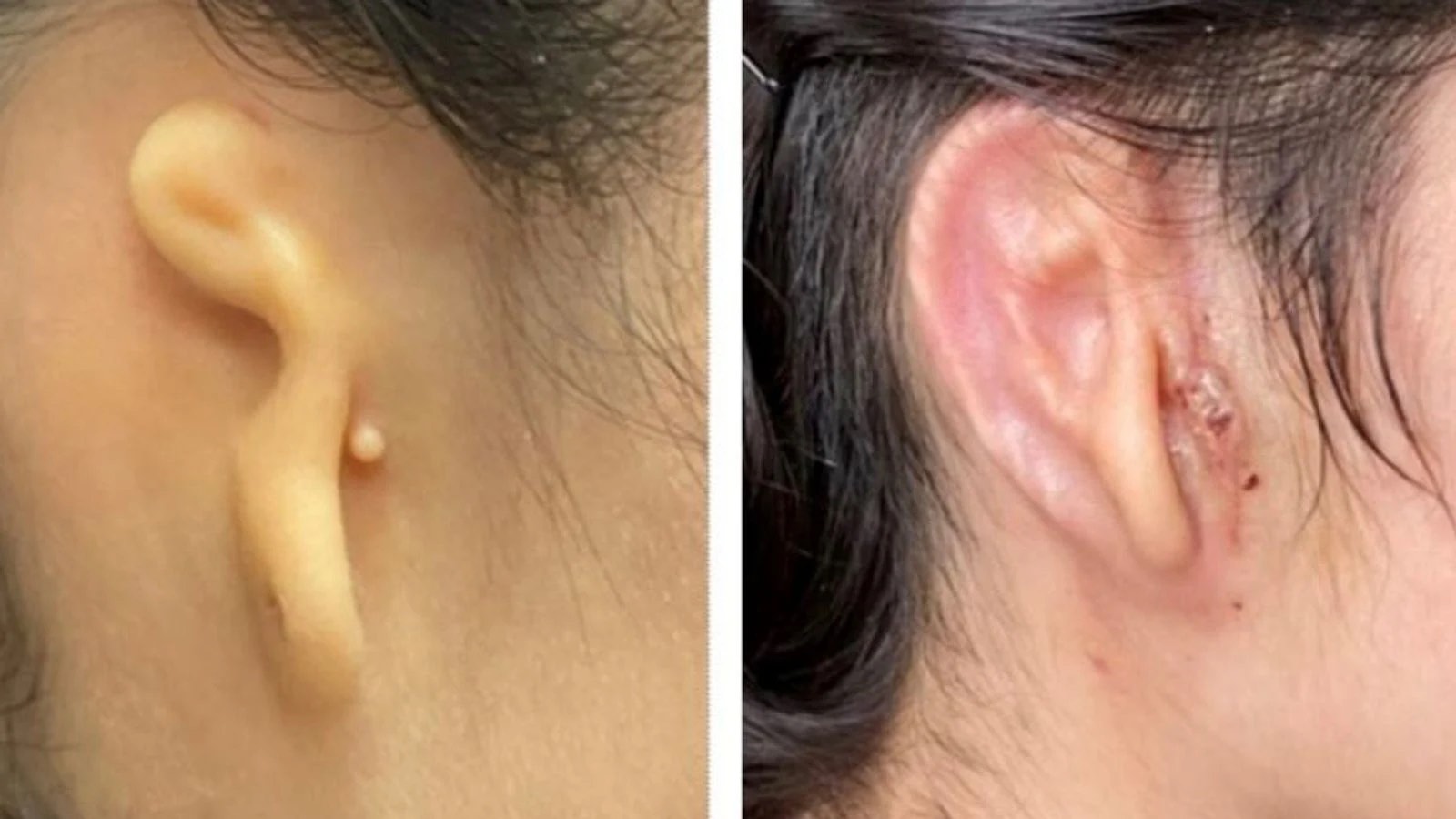
Patient before transplant (left) and 30 days after the procedure (right)
Microtia-Congenital Ear Institute and 3DBio Therapeutics
Human ear reconstruction
3DBio Therapeutics, a regenerative medicine company, and the Microtia-Congenital Ear Deformity Institute announced they have conducted a human ear reconstruction...

Patient before transplant (left) and 30 days after the procedure (right)
Microtia-Congenital Ear Institute and 3DBio Therapeutics
Engineer position
The "Hepatic Organoids" group of UMRS_1193 is looking for an engineer for a period of 3 years as part of a project funded by the "Fondation pour la Recherche Médicale"
The project aims to study liver organoid transplantation in models of severe hepatitis.
To apply, please send your application to the following email addresses: jean-charles.duclos-vallee@aphp.fr and/or jean-charles.duclos-vallee@ifbf-institute.org

Engineer position
The "Hepatic Organoids" group of UMRS_1193 is looking for an engineer for a period of 3 years...

Organoid imaging
The Paris-Saclay Cellular Imaging Network is organizing a 2-hour videoconference on April 14 on the theme of organoid imaging.
The network offers you a kind of pipeline on the imaging of organoid models which will allow you to better understand the whole manufacturing process, their modes of transparency, the analysis of 3D images associated with this type of thick sample, and finally, the importance of studying these models in humans to develop new therapeutic tools.
Free but compulsory registration on www.ric-paris-saclay.fr
Download the conference poster here.

Organoid imaging
The Paris-Saclay Cellular Imaging Network is organizing a 2-hour videoconference on April 14 on the theme of organoid imaging...

These organoids have adult characteristics and functions
Whatever the cause, liver diseasse can lead to severe liver failure for which a liver transplant becomes necessary. Today, the use of hepatic organoids, derived from human induced Pluripotent Stem Cells (hiPSC), appears to be a promising prospect of palliative therapy for the shortage of grafts.
Using guided differentiation and three-dimensional culture, a team from UMR-S 1193 (CHB Hepato-Biliary Center, Paul-Brousse Hospital, Villejuif), generated, from hiPSCs, organoids containing hepatocytes with morphological and functional characteristics, for the first time, almost similar to those of primary human hepatocytes. In the study published in Cells, the researchers show that these organoids are able to reproduce in vitro functions such as the regulated metabolism of sugars and lipids which are essential for the homeostasis of the organism, as well as the production of bile essential for the proper absorption of lipids and the ability to detoxify drugs and toxic substances from metabolism or the environment.
The organoids thus produced could become valuable tools for the development and optimization of preclinical applications, such as new platforms for screening drug candidates and the study of their toxicity, and clinical applications such as new biomedical devices like external bioartificial livers (BAL), or even transplantation.
This work was carried out as part of the RHU iLite project funded by the PIA2 in the form of grant ANR-16-RHUS-0005.
The study can be downloaded here.
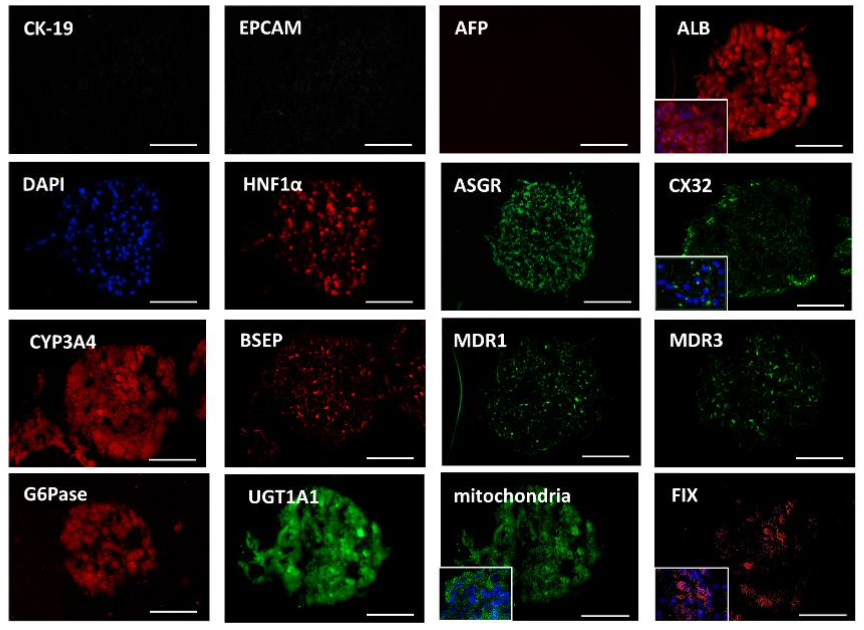
These organoids have adult characteristics and functions
...Using guided differentiation and three-dimensional culture, a team from UMR-S 1193 (CHB Hepato-Biliary Center, Paul-Brousse Hospital, Villejuif), generated, from hiPSCs, organoids containing hepatocytes with morphological and functional characteristics, for the first time, almost similar to those of primary human hepatocytes...

Biopredic recherche un technicien de production en organotypique et culture cellulaire
Biopredic recherche un technicien de production en organotypique et culture cellulaire
"Organ-on-a-chip" workshop
BioValley is a pan-European cluster bringing together players in the fields of health and life sciences, French, German and Swiss based in the Rhine Valley.
On February 23 and 24, BioValley France is organizing a workshop devoted to organs-on-a-chip, which will be an opportunity for researchers, entrepreneurs and representatives of the pharmaceutical industry to present their work.
Cécile Legallais and Jean-Charles Duclos-Vallée, members of the Scientific Committee of IFBF, will speak.
This video presents the workshop.
"Organ-on-a-chip" workshop
BioValley is a pan-European cluster bringing together players in the fields of health and life sciences, French, German and Swiss based in the Rhine Valley.
On February 23 and 24, BioValley France is organizing a workshop devoted to organs-on-a-chip...
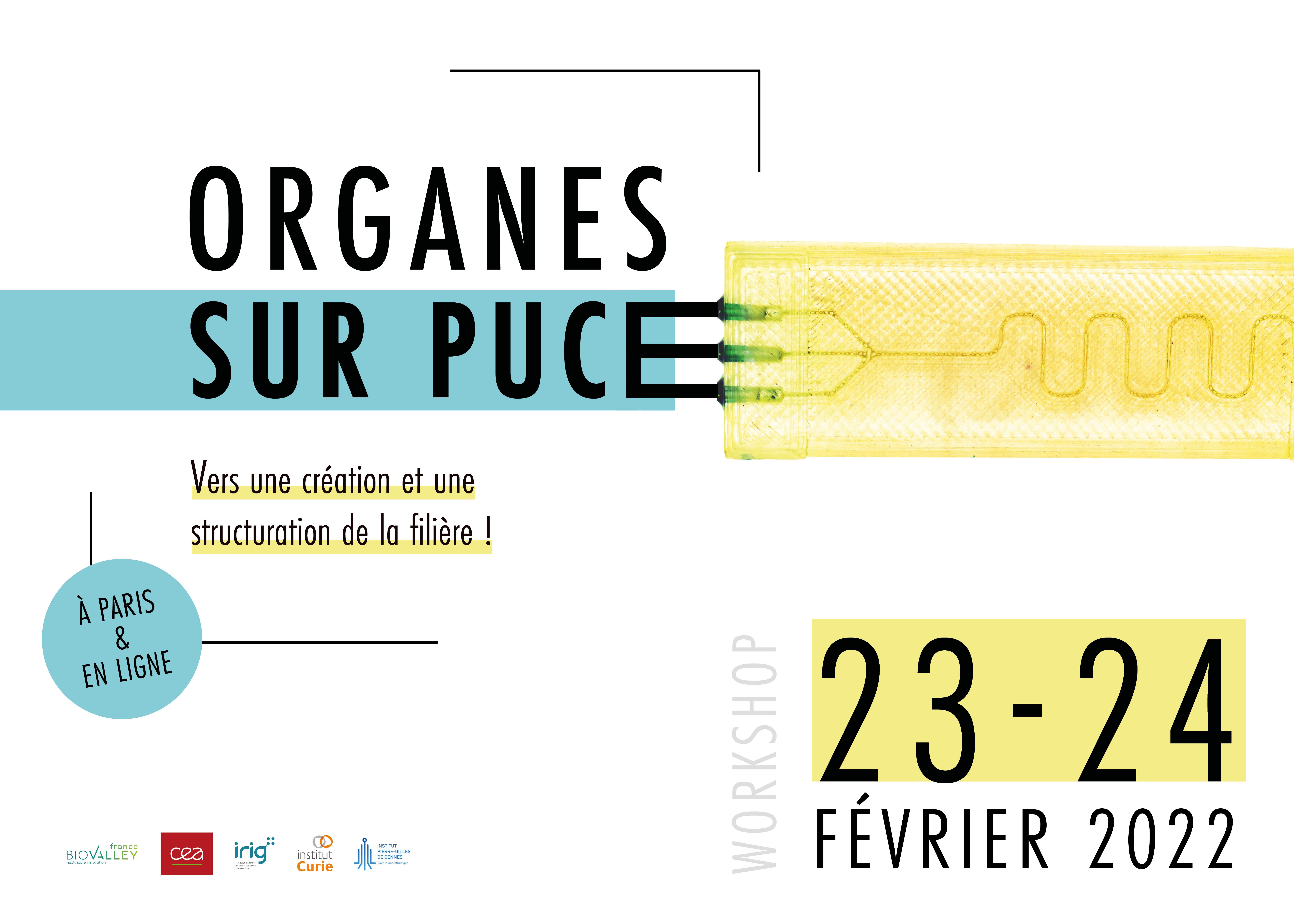
Advanced Master Programme in Life Sciences and Health Management
ESCP is launching two new specializations allowing its students to acquire hybrid skills. According to its Deputy Director General in charge of academic and international affairs “These two new multi-skill specializations (entrepreneurship and health, management and engineering) and professionalization meet and anticipate perfectly the requirements of the professions of tomorrow. The APIL specialization, Advanced Master Program in Life Sciences and Health Management, was set up in partnership with Institut Pasteur. It is aimed at students with an interest for innovation, business development and entrepreneurship dedicated to life sciences and health. This program will be co-directed by professors Dominique Franco, director of digital education at Institut Pasteur and vice-president of IFBF, and Frédéric Jallat at ESCP.
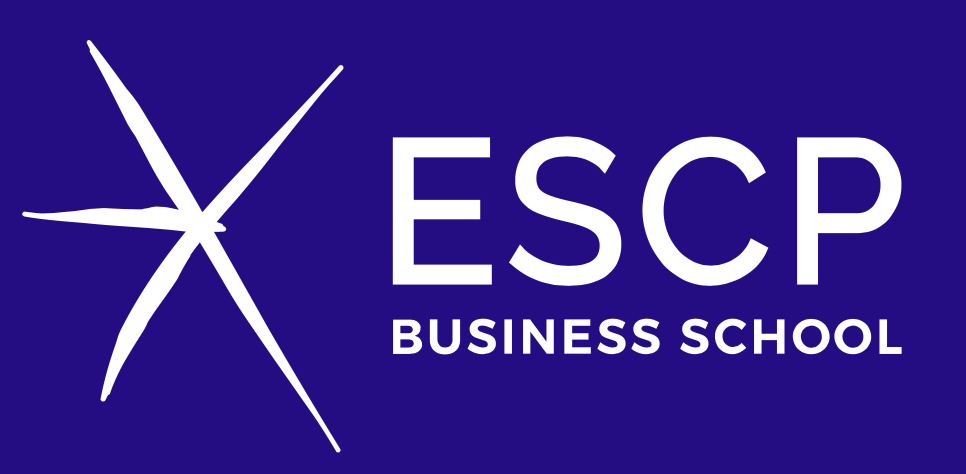

Advanced Master Programme in Life Sciences and Health Management


Hepatic organoids - What are the stakes?
In its October 2021 issue, the medicine sciences journal publishes an article some of the authors of which are members of IFBF.
"Hepatic organoids - What are the stakes?" is interested in these 3-dimensional structures integrating one or more cellular types that mimic the functions of the liver. Their applications are numerous: study of the liver development, mass production for transplantation or the development of bioartificial livers, modeling of pathologies and high throughput screening of drugs, toxicity studies. The economic and ethical issues of their future therapeutic use are important.
The article (in French) can be downloaded here.
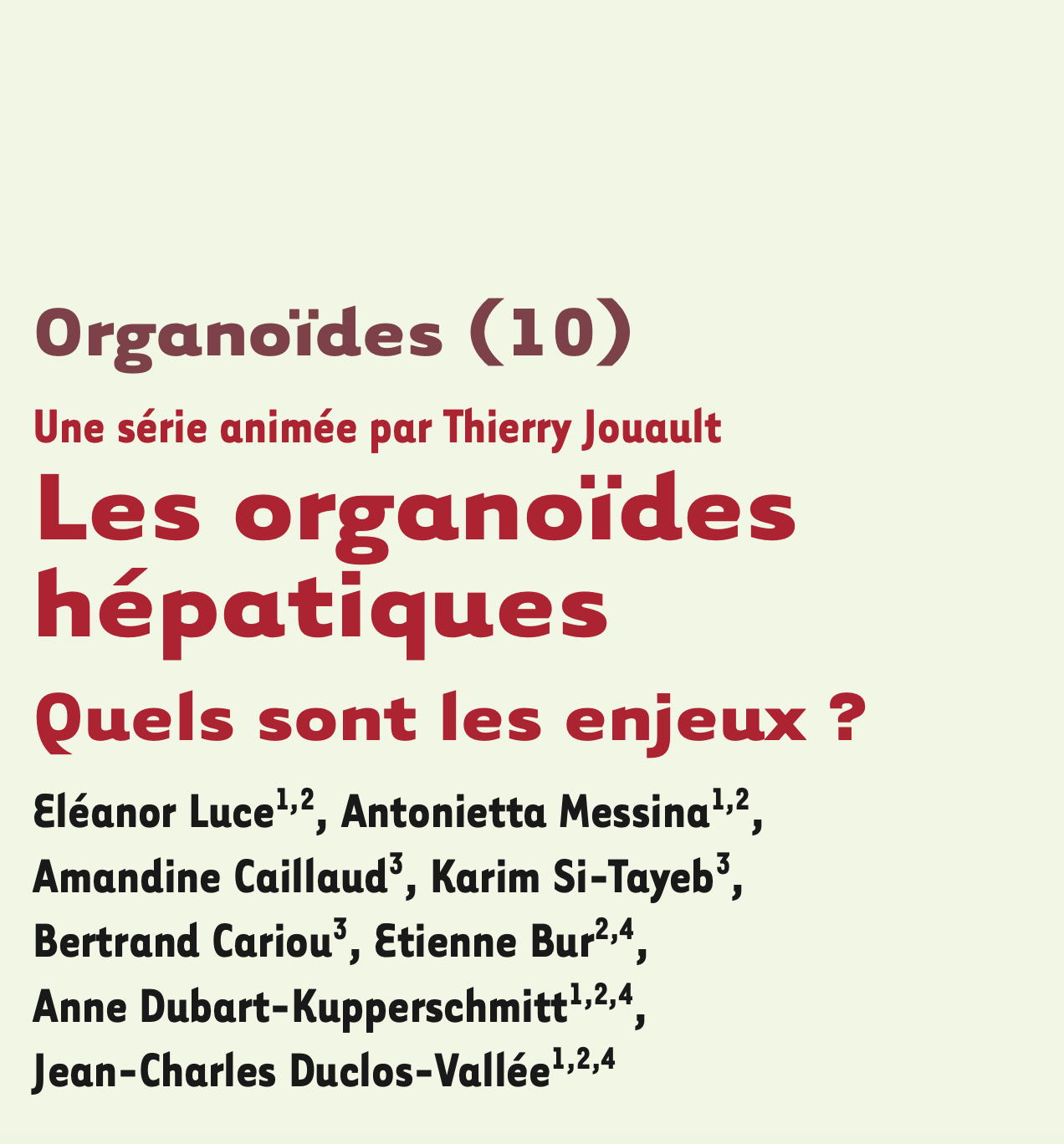
Hepatic organoids - What are the stakes?
In its October 2021 issue, the medicine sciences journal publishes an article some of the authors of which are members of IFBF.
"Hepatic organoids - What are the stakes?" is interested in these 3-dimensional structures...
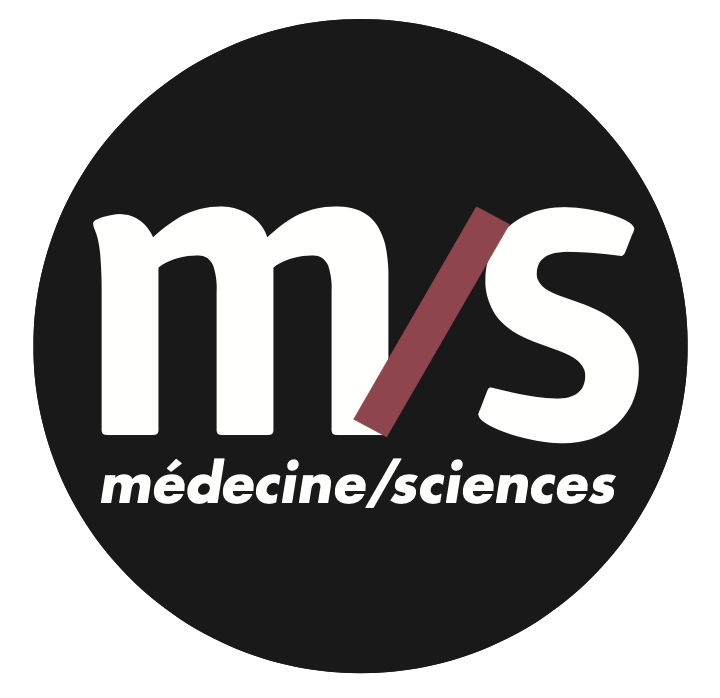
Next annual meeting of the FSSCR on the 9th & 10th of November
The next annual meeting of the French Society for Stem Cell Research (FSSCR) will be held on the 9th and 10th of November 2021 in Montpellier.
The agenda of this two-day meeting is here.
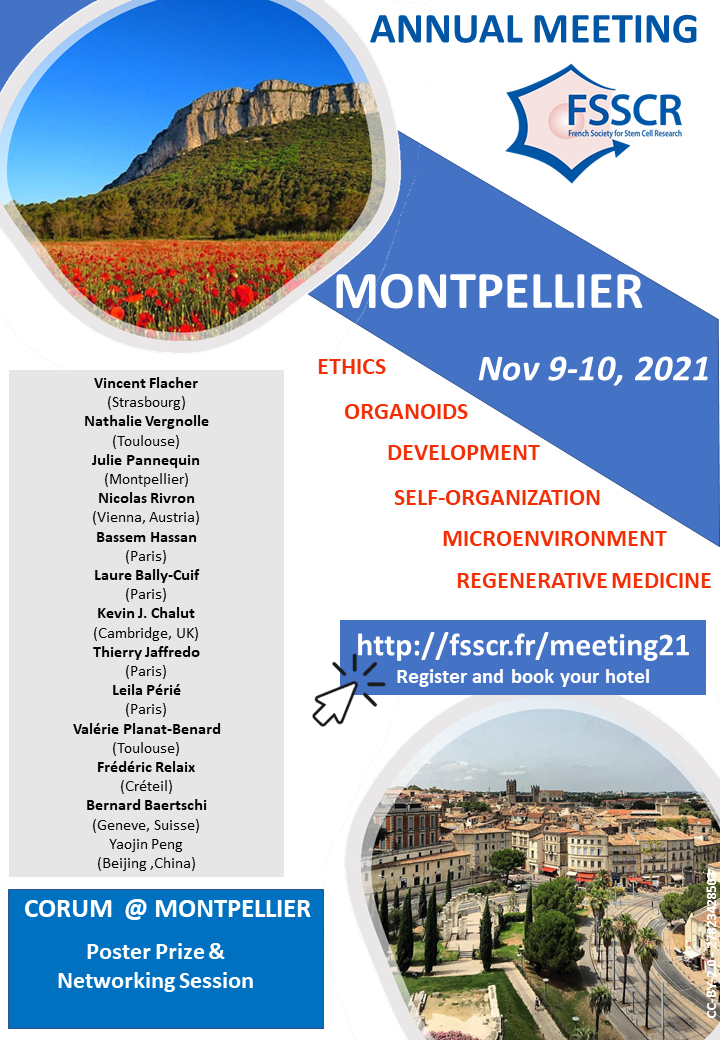
Next annual meeting of the FSSCR on the 9th & 10th of November
The next annual meeting of the French Society for Stem Cell Research (FSSCR) will be held on the 9th and 10th of November 2021 in ...
